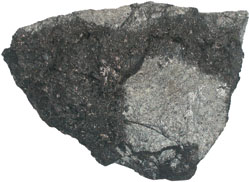 |
|
|
Outsourcing overhyped Denouncing “exaggerated alarmism,” Daniel Drezner, assistant professor of political science, downplays the economic effects of outsourcing white-collar positions to countries like India. In the May/June Foreign Affairs, Drezner writes that “most of the numbers thrown around are vague, overhyped estimates,” arguing against drawing a connection between international competition and high unemployment. Rather, as with the manufacturing industry, “the creation of new jobs overseas,” he predicts, “will eventually lead to more jobs and higher incomes in the United States.”
Meteorite weighs in University researchers have sized up the space rock that scattered over Chicago’s south suburbs in March 2003. The meteorite weighed at least 1,980 pounds before hitting Earth’s atmosphere, a team led by Steven Simon, senior research associate in geophysical sciences, reports in the April Meteoritics and Planetary Science. With chunks strewn in backyards and there for the testing, the scientists calculated the projectile’s heft, measuring absorbed galactic-cosmic rays and a radioactive form of cobalt. They also classified it as an L5 chondrite, a fairly common variety of meteorite. Foster carelessness Teenagers in foster care face a rough transition into adulthood, according to a new study led by Chapin Hall Center for Children Director Mark Courtney. Confirming earlier results from Wisconsin (See February/03 “Investigations”), the first installment of a broader survey tracking 749 17-year-olds in that state, Illinois, and Iowa as they turn 18 and “age out” of the welfare system paints a bleak picture. The youths have three times the rate of mental-health and substance-abuse problems as their peers from more traditional homes. Nearly two-thirds of the boys and half of the girls have been arrested, convicted of a crime, or sent to a correctional facility. And more than half can’t read at a seventh-grade level. The Chapin Hall team plans to interview the teens again around their 19th and 21st birthdays. After-school inactivity Another Chapin Hall Center for Children study finds most teenagers fly solo once Chicago Public Schools (CPS) lets out each day. According to a survey released in March, after the bell rings only 25 percent of ninth-graders take part in activities such as sports, music lessons, and community service. Meanwhile, 33 percent go home to watch siblings and other kids, and about 6 percent work. But the majority, 80 percent, spend at least two hours alone. For those participating in programs, friendship and fun rank higher than skill acquisition or job readiness as motivating factors. More than half of CPS’s 33,000 ninth-graders completed the survey. The genes behind humans’ primate primacy Humans may have two genes to thank for leaving monkeys in their evolutionary dust. Through natural selection, changes in Microcephalin and ASPM—which control brain size during development—may have contributed to the human cerebral cortex getting bigger, University researchers report in the January 13 and April 2 Human Molecular Genetics. A team led by Bruce Lahn, assistant professor in human genetics and molecular genetics & cell biology, compared the genes’ sequences in humans, chimpanzees, and other animals. They found an acceleration in mutations in the primate lineage that could account for humans’ extra gray matter.—M.L.
|
|
phone: 773/702-2163 | fax: 773/702-8836 | uchicago-magazine@uchicago.edu

 Citations
Citations